BioXpress Therapeutics is focused on developing biosimilar monoclonal antibodies (mAbs).
BioXpress Therapeutics currently has five programs in development, two of which are partnered with worldwide rights.
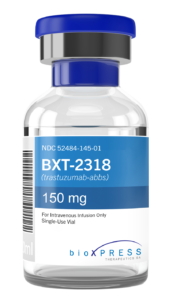
APPROVED INDICATIONS
- Metastatic breast cancer
- Adjuvant breast cancer: Herceptin is indicated for adjuvant treatment of HER2 overexpressing node positive or node negative (ER/PR negative or with one high risk feature breast cancer).
- Metastatic gastric cancer
CONTACT US for interest in our trastuzumab-abbs. Full CMC documentation available upon request.
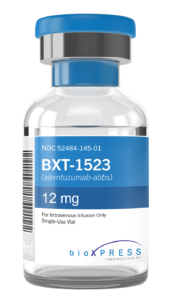
APPROVED INDICATIONS
Within the European Union and U.S., alemtuzumab is indicated for the treatment of adult patients with relapsing-remitting multiple sclerosis (RRMS) with active disease defined by clinical or imaging features
The FDA has approved alemtuzumab for B-cell chronic lymphocytic leukemia (B-CLL)
CONTACT US for interest in our alemtuzumab-abbs. Full CMC documentation available upon request.
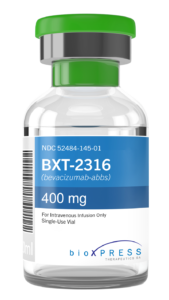
APPROVED INDICATIONS
The FDA has approved bevacizumab for eight indications including: colorectal cancer, non-small cell lung cancer, glioblastoma multiforme, renal cell carcinoma, cervical cancer, ovarian cancer, fallopian tube cancer, and peritoneal cancer.
CONTACT US for interest in our bevacizumab-abbs. Full CMC documentation available upon request.
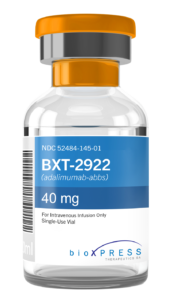
APPROVED INDICATIONS
The FDA has approved adalimumab for: rheumatoid arthritis, juvenile idiopathic arthritis, psoriatic arthritis, ankylosing spondylitis, adult crohn’s disease, pediatric crohn’s disease, ulcerative colitis, ulcerative colitis, hidradenitis suppurativa, uveitis
Contact us for interest in our adalimumab-abbs. Full CMC documentation available upon request.
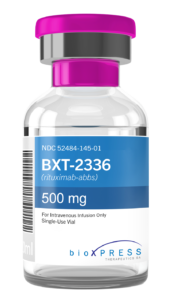
APPROVED INDICATIONS
The FDA has approved rituximab for: chronic lymphocytic leukemia, rheumatoid arthritis, non-Hodgkin’s lymphoma, granulomatosis with polyangiitis, microscopic polyangiitis and pemphigus
Contact us for interest in our rituximab-abbs. Full CMC documentation available upon request.
The world-class team at BioXpress has been involved in the development of 12 originator biologics , seven of which are monoclonal antibodies, including Herceptin®, Rituxan®, Avastin®, Xolair®, Vectibix®, Xgeva® and Humira®.
FUTURE PROGRAMS
With the exponential increase in monoclonal antibody approvals in the past years, this has given rise to a much larger pool of candidate drugs from which to select our future pipeline of biosimilar drugs. Armed with extensive experience built up since its inception, the BioXpress team is poised to commence development of new biosimilar candidates. We have carefully researched and analyzed various factors, including but not limited to patent expiration, market size, indication and detailed clinical profiles for monoclonal antibodies approved in the past five years and have selected our next round of candidates.
BioXpress remains committed to making its monoclonal antibody biosimilar therapeutics affordable and available to the developing world market. While several of the new monoclonal antibody products target rare disorders, we realize that these highly priced drugs, associated with high costs in manufacturing, may not be of optimal fit for emerging markets. Target indication for new antibody therapeutics also include cardiovascular diseases, inflammatory diseases such as asthma, and of course the very effective new immune-oncology drugs. These are diseases that are growing in both developed and developing countries and for which pharmacological management has been greatly improved with the approval of new antibody therapeutics. For example, treatment of asthma has made great advances in recent years because biologic therapeutics can specifically target key inflammatory pathways thereby reducing side-effects associated with earlier generation drugs.